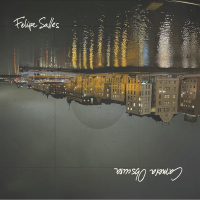Home » Jazz Articles » Year in Review » Karl Ackermann's Best Creative Music of 2021
Karl Ackermann's Best Creative Music of 2021

Wadada Leo Smith
trumpetb.1941

Satoko Fujii
pianob.1958

Matthew Shipp
pianob.1960
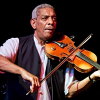
Billy Bang
violin1947 - 2011
Bo van de Graaf
saxophone
Sara Schoenbeck
bassoon
Nels Cline
guitar, electricb.1956

James Brandon Lewis
saxophone, tenorb.1983


Ches Smith
drumsPath of Seven Colors
Pyroclastic Records
For some time, drummer/composer Ches Smith kept his interest in the Voudou music of Haiti at bay. Recognizing himself as an outsider in that world, he researched, listened, studied, and after years brought a project to fruition. Smith's group We All Break released its self-titled, self-produced debut in 2017 and received less attention than deserved. Now on

Kris Davis
pianob.1980

Craig Taborn
pianob.1970

Tim Berne
saxophone, altob.1954

Marc Ribot
guitarb.1954

Mary Halvorson
guitar Ill Considered
Ill ConsideredLiminal Space
New Soil
The rare studio recording for the current trio formation of Ill Considered loses none of the visceral energy of their marathon live recordings. The trio incorporated live performance with studio modifications from the extensive roster of guests. The approach is frequently amorphous and could have been a jumble. Yet, there's nothing messy or distracting about the multiple layers of production and the free-form contributions.
Ill Considered increasingly becomes a shining hope for the future of jazz. Self-assured in their group agenda, the trio flawlessly navigates borderless territories with such ease that they inspire each other and the listener. They bring the genre to a new, younger, non-jazz audience that may stick around for their hypnotically unflustered grooves and primordial rhythms. Not yet riding the crest of London's contemporary jazz wave, Ill Considered has limitless potential.

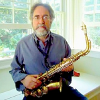
Allen Lowe
saxophoneA Love Supine: Ascension into the Maelstrom
ESP Disk
A Love Supine: Ascension into the Maelstrom is an ambitious double-disc collection recorded in four sessions in 2018. The eighteen tracks were all composed by Lowe. The sessions feature different lineups, with some overlap, and Lowe on alto saxophone in each setting. Lowe's historian alter-ego frequently crosses over to his eclectic music, and the spectre of Coltrane hangs over the pieces on A Love Supine, often in esoteric ways that are not at all obvious but are uniquely Lowe. His James Lamb-inspired ragtime "Blood of the Lamb/Opening Theme: Blue Dirge" celebrates the largely unsung contemporary of Scott Joplin and James Scott. Along with "Tiger Rage" the two pieces play like idiosyncrasies of a Bourbon Street parade.
Lowe has launched several projects far-reaching in scope but, with A Love Supine, he captures a broad chronicle of American pre-jazz and jazz through the richness of his own sound. The musicianship, especially that of pianist Lewis Porter, trombonist Brian Simontacchi, and guitarist Ray Suhy, is top-shelf. Much like his written word projects, Lowe displays sophistication, humor, and defiance.
 Billy Bang
Billy BangLucky Man
BBE Records
When he performed in Germany, they called him the "black devil violinist," his frenetic playing wrapped in a gyrating, trance-like state. For Billy Bang, who believed he had schizophrenia, the epithet bore a resemblance to his inner turmoil. He fought in the infantry during the bloodiest period of the Vietnam War's TET Offensive. Back home, his expertise in weaponry led to a job buying guns for a black militant group. He wandered into a pawnshop's backroom on one such buying trip in Baltimore and found a twenty-five-dollar violin hanging from the wall. He brought it home and started over. There are twenty-two audio tracks on Lucky Man of which twelve are spoken narrations mostly alternating with musical tracks. The music is unlike anything else that Bang had recorded.
The spoken tracks are mesmerizing and seamlessly incorporated into the field recordings. Bang sometimes sounds like he has conquered his demons, but at other times, his pain is palpable. Bang talks about the trauma of coming home to a country jeering rather than cheering its vets. There's no bitterness in his voice, but there is profound sadness, regret, and a reluctant acceptance. The music conveys much the same context and emotion; Bang's trademark acerbic but animated style is peppered with the violinist's inner dialog. He says, "You can't hurt a guy that got no more feelings." Bang's final act may have been his best.
 Matthew Shipp
Matthew ShippCodebreaker
Tao Forms
An intrinsic value in Matthew Shipp's music is his insight into the language of his chosen profession. The processes that have led to one hundred years of change in jazz are embedded in his compositions and improvisations. More than a dozen solo piano albums into his thirty-five-year recording career, Codebreaker, Shipp's latest such effort, furthers his exceptional amalgam of spontaneous improvisation and historical authenticity. More concise than many of the pianist's projects, the compact pieces serve to highlight the expressive content of several performances, intensified by Shipp's moderation.
The content on Codebreaker is more euphonious than the pianist's recent solo outings, but it is a relative correlation. The album is more melodic, but it is so through Shipp's lyrically oblique worldview. He lets listeners discern for themselves if there is a more resounding theme across the eleven compact tracks. Still, the transition from the tranquil opening title track to "Spiderweb" and then "Disc" depicts a loose trajectory. By the time we get to the second half with "Green Man," logic has developed. Shipp has cracked the combination, and we can hear the pieces falling together in the tumbler. When Codebreaker concludes with "The Tunnel," it is with an exhalation of relief.


Fred Lonberg-Holm
cellob.1962

Abdul Moimême
guitar, electricb.1959
Carlos Santos
electronicsTransition Zone
Creative Sources
Chicago-based cellist Fred Lonberg-Holm has long been in the vanguard of free improvisation. But along with free jazz, he has recorded in the rock and country genres, and composed concert works. He is joined on Transition Zone by two leaders of Lisbon's creative music scene. Dual-electric guitarist/composer Abdul Moimе║me and electronics artist/composer Carlos Santos bring their extraordinary abilities to create ethereal soundscapes to this impressive project. For moments at a time, Transition Zone glides dispassionately across an alien landscape only to attract a resistance that sets the trio to scraping and crunching their way through. It evokes nothing so much as harrowing proximity to the edge of an unfamiliar world. Yet, there is an inspiring beauty almost as intangible as the species generated by the instruments in this album.


Eberhard Weber
bassb.1940
Once Upon A Time -Live in Avignon
ECM
Once Upon A Time-Live in Avignon is the fourth release of ECM-sourced material from the celebrated German bassist Eberhard Weber whose 2007 stroke left him unable to play. Rедsumед (2012) consisted of bass solos extracted and re-engineered from Weber's work with

Jan Garbarek
saxophoneb.1947

Ack Van Rooyen
flugelhornb.1930
Solo bass recordings are an acquired taste and struggle to be compelling even at their most imaginative. Weber's exceptional Pendulum, while largely praised, drew mixed reactions overall, with some finding the bassist's reticent nature and his repetitive self-accompaniment weighing the music down. Once Upon A Time-Live in Avignon should generate no such debate. Weber's compositions, exceptional playing, and unique voice make this an extraordinary album.


Satoko Fujii
pianob.1958
Piano Music
Libra
The solo piano works of Satoko Fujii often summon an ethereal ensemble of sounds. Prepared, or in its natural state, her piano speaks as a proxy for the always searching composer/improviser. Fujii's recordings are an ongoing stream of themes based on the here and now for an artist who does not fit neatly into any category. The loss of close band members, her kanreki (sixtieth birthday celebration), the pandemic, and her personal emergence, are all refrains that inform her creative process. A half-dozen solo albums in, Piano Music is one of her more ambitious projects.
From her enormous orchestral projects to these intimate ventures, all of Fujii's work is defined by individualism. Piano Music is yet another improvisational opportunity with its quiet power and good-natured gaudiness. In parallel, the album is a defiant cuff at the significance of pandemic isolation and its effect on creativity. Fujii works in the contrasting aspects of her music in big tones, sound combinations, and slight passages.


Marc Johnson
bassb.1953
Overpass
ECM
The virtuoso bassist Marc Johnson has kept a relatively low profile as a leader. A graduate of the prestigious North Texas State University jazz program, Johnson made his mark as a member of

Bill Evans
piano1929 - 1980

John Abercrombie
guitar1944 - 2017

Peter Erskine
drumsb.1954

Bill Frisell
guitar, electricb.1951

Eliane Elias
piano and vocalsb.1960


Jeff Pearring
saxophone, altoSocially Distanced Duos
Self Produced
Jeff Pearring's background in jazz, classical, reggae, and other genres has informed his creative process in ways that are not always apparent. That turns out to be a good thing as his ability to encapsulate influences without genuflecting is part of his music's appeal. The alto saxophonist, a Brooklyn-based Colorado native, is a

Connie Crothers
piano1941 - 2016
 East Axis
East AxisCool With That
ESP Disk
Free improvisation has a special place in a polarized world. It accepts and rejects jazz culture in an ebb and flow of unprompted ideas. On the album Cool With That, we get the essence of the music's history from the inside, out. The quartet East Axis is new in name but the unit has been in place for several years and its members are well-known. Pianist Matthew Shipp, saxophonist Allen Lowe, bassist
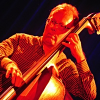
Kevin Ray
bass
Gerald Cleaver
drumsb.1963
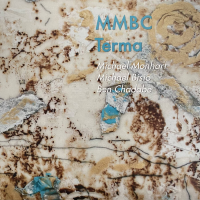

Michael Bisio
bass, acousticMMBC Terma
Self-Produced
Among the side effects of the 2020-2021 pandemic has been the rediscovery of misplaced resources. The trio MMBC dug up the fourteen-year-old recording MMBC Terma, a collection of nine group compositions and improvisations. MMBC is an acronym condensing the initials of the players. Tenor saxophonist (and psychoanalyst)
Michael Monhart
saxophoneBen Chadabe
drumsThe trio creates sounds of ethereal serenity and, alternately, colliding worlds. Monhart, Chadabe, and Bisio have plenty to say, and this album makes one wish they had created a larger body of work as a unit. Bisio has said that he hopes his music is a healing force; it is very much so on this album, which grows with repeated listening. The CD cover features the fascinating visual art of Dawn Bisio, Michael's wife.
 Wadada Leo Smith
Wadada Leo SmithTrumpet
TUM Records
In a half-century of recording, he has never stopped exploring the parameters of the form and instrument. Listening to composer/trumpeter Wadada Leo Smith is demanding but rewarding. His inspirations are classical in the small 'c' sense: the AACM, Persian music, August Wilson, Stravinsky, spirituals, and so on. Before the masses woke, Smith's music had incorporated political, cultural, spiritual, and environmental awareness. The elder statesman of new music continues his prolific output with TUM Records box sets for the first half of 2021. His Sacred Ceremonies three-disc release features bassist

Bill Laswell
bassb.1955

Milford Graves
drums1940 - 2021

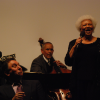
Roberto Miranda
bass, acousticLive at the Bing Theater; Los Angeles, 1985
Dark Tree Records
Roberto Miranda has appeared on almost one-hundred albums but has been lightly recorded as a leader, and inexplicably struggled to generate interest among labels. Dark Tree Records has released some great

Horace Tapscott
piano1934 - 1999

Johan Lindstrom
guitarOn The Asylum
Moserobie Music
Multi-instrumentalist and composer Johan Lindstrom issued his 2018 septet debut Music For Empty Halls (Moserobie Music) to global accolades. The unique set was nominated for a Swedish Grammy, an award that Lindstr?m had captured on four previous occasions. The debut was noted for its unhurried and democratic approach to creative ensemble music. On the Asylum, the second outing of the Johan Lindstr?m Septett surpasses its predecessor as a stunning and eclectic project.
Lindstr?m craftily weaves discord into the otherwise bucolic On the Asylum, many of the pieces transitioning without a break, creating a suite-like feeling. There is the gentle swing of "Edwards Chacone," Margareta Bengtson's celestial harp on "Music Orbit Box," and the stately orchestration of "Humming Ships," featuring one of two vocal appearances by Sofie Livebrandt. The collection closes with "Worms of the Underground," an exotic four-track pedal steel guitar concoction. On the Asylum is one of those rare albums which appeals at every point, beginning to end, and on repeated listening.
 PLS.trio
PLS.trioCosmonauts
Dot Time Records
Five years passed between the debut release from PLS.trio and this follow-up. East River (Echo Chamber) was one of the best albums of 2015 and elevated the piano trio format in a way that had not been heard since the

Esbjorn Svensson
piano1964 - 2008
The justified comparisons of PLS.trio to e.s.t. are felt on "Look Ahead," and "B.E.C"; reflective but with powerful, driving rhythms, the band's interactions are on a higher level. The album closes with an unusual interpretation of Puccini's "Nessun Dorma" from the opera Turandot. Italian vocalist Giorgia Renosto supplies a warm, rich, and low-key reading which conceals the aria's origin. Cosmonauts finds PLS.trio looking outward and experimenting but not so much as to obscure their unique talent for stunning spontaneity.


Becca Stevens
vocals
Elan Mehler
pianoPallet On Your Floor
Newvelle Records
It would be easy to describe Stevens and Mehler as an amicable duo given the familiarity and gracefulness that pervades Pallet on your Floor. But there is more here; Stevens lends an incandescent quality to old, over-recorded standards such as Gershwin's, "Our Love is Here to Stay," and the Van Heusen-Burke classic "But Beautiful." Stevens mines her deep, rich, stylistic references to put a unique spin on these pieces. In tandem with Mehler's noctilucent readings, it is all very fresh and engaging. The highlights of Pallet on your Floor are the blues numbers.

Duke Ellington
piano1899 - 1974

W.C. Handy
arranger1873 - 1958


Adam Berenson
synthesizerScott Barnum
bass
Bob Moses
drumsb.1948
Assemblages
Dream Play Records
Keyboardist and composer Adam Berenson has at his disposal an arsenal of instruments, electronics, synthesizers, etc. But to hear him in the traditional acoustic piano trio setting is immensely enjoyable, while hardly "traditional." On the double-disc Assemblages, Berenson puts aside his plugged-in instruments in favor of the piano and colleagues Scott Barnum on double-bass and Bob Moses on percussion. Assemblages is unconventional, even in its quietest moments. It takes rare agility to efficiently move in and out of all these musical worlds without leaving a telltale footprint between. Berenson composed fourteen of the twenty tracks, the remainder being group efforts. The pianist's work neither romanticizes nor conveys detachment. Barnum and Moses are a great rhythm section contributing complex articulation or laying low when warranted. Assemblages is sophisticated and warm and rewards repeated listening.
Tags
Comments
PREVIOUS / NEXT
Support All About Jazz
 All About Jazz has been a pillar of jazz since 1995, championing it as an art form and, more importantly, supporting the musicians who make it. Our enduring commitment has made "AAJ" one of the most culturally important websites of its kind, read by hundreds of thousands of fans, musicians and industry figures every month.
All About Jazz has been a pillar of jazz since 1995, championing it as an art form and, more importantly, supporting the musicians who make it. Our enduring commitment has made "AAJ" one of the most culturally important websites of its kind, read by hundreds of thousands of fans, musicians and industry figures every month.







 Buy Now
Buy Now



